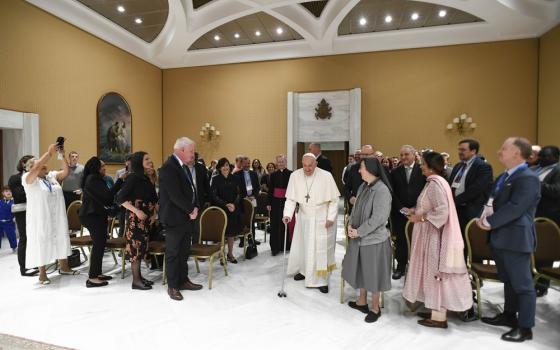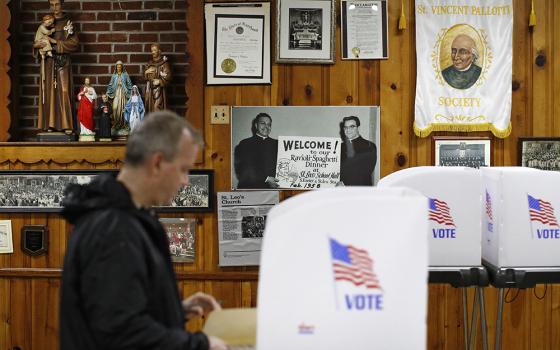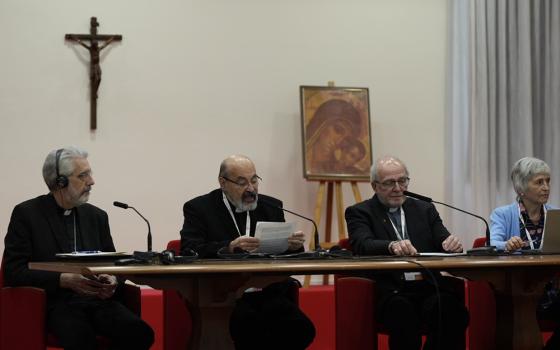
On the season finale last year of ABC's hit drama "Lost," alert viewers would have noticed that the mysterious character, Jacob (Mark Pellegrino), was reading the book Everything That Rises Must Converge. The tome is a collection of short stories by the American Catholic novelist, Flannery O'Connor who was born in Savannah, Ga. March 25, 1925 and died from lupus in Milledgeville, Ga., outside of Atlanta in 1964.
The book's title story is about an arrogant young man, Julian, whose bigoted mother cajoles him into accompanying her downtown to her weight loss class because it is evening and she doesn't want to go alone in the newly integrated South. Things become tense when an African-American mother and son get on the bus, the mother wearing the exact same outlandish purple hat as Julian's mother. Julian tries to teach his mother a lesson that the world is different now and she must change. His meanness results in tragedy and he races for help for his mother who collapses. O'Connor ends the tale with, "The tide of darkness seemed to sweep him back to her, postponing from moment to moment his entry into the world of guilt and sorrow."
The book's title is a quote from "Omega Point" by the French Jesuit Pierre Teilhard de Chardin, who was one of O'Connor's great influences. For Chardin, the transcendent "omega point" is where the complexity and consciousness of the universe is heading and from whence it originated. O'Connor's short story applies Chardin's idea to changing racial realities and attitudes in the American south by the convergence -- or collision -- of two mother and son pairs, one white and one black. In "Lost," the appearance of Jacob, the ever-young and seemingly all-knowing authority figure, wakes an unconscious man, and is a signal that things are beginning to converge for the characters; their redemption is at hand, we hope.
Convergence is just one of O'Connor's favorite themes; in fact it could be argued that the image of literary unity it conjures up could characterize her entire body of work. All her stories are constructed on the idea of sin, grace, and redemption. The sacramental emerges through unexpected encounters, misfits and misplaced persons, journeys, body-parts, the grotesque, dark humor, and violence that are among her mysterious tropes, motifs and symbols.
But who was Flannery O'Connor, does she still matter, and why is Hollywood interested?
Southern born and bred
Mary Flannery O'Connor was the only child of Edward F. O'Connor and Regina Cline O'Connor. According to Flannery: A Life of Flannery O'Connor by Brad Gooch, she was six years old when she taught a chicken to walk backwards. She later recounted to a friend, "When I was six, I had a chicken that walked backward and was in the Pathe' News. I was in it too with the chicken. I was just there to assist the chicken but it was the high point in my life. Everything since has been anticlimax."
She attended Catholic schools until almost the end of seventh grade when the family moved to Atlanta. Flannery and her mother moved to a farm in Milledgeville after her father's death from lupus in 1941. They named the farm Andalusia. She earned a degree in social sciences at the then Georgia State College for Women and an MFA at the Iowa's Writers Workshop at the University of Iowa. By 1949 she had met Robert Fitzgerald, translator of Homer's Odyssey and other Greek classics, and his wife Sally and stayed with them for two years as she began her writing career. Sally later edited Flannery's letters in Habit of Being. Flannery was also the godmother of one of the Fitzgerald's five children but could never remember which one. She even baby sat for Benedict Fitzgerald, who went on to write the screenplay (with his brother Michael) for O'Connor's Wise Blood and Mel Gibson's "The Passion of the Christ".
I "met" Flannery O'Connor a few years ago when a friend, Randy Testa, quoted something she said about the role of fiction; I was immediately taken. "Fiction is the concrete expression of mystery -- mystery that is lived. Catholics believe that all creation is good and that evil is the wrong use of good and that without grace we use it [good] wrong most of the time. It is almost impossible to write about supernatural grace in fiction. We almost have to approach it negatively. As to natural grace, we have to take that the way it comes -- through nature. In any case, it [grace] operates surrounded by evil. "
But Flannery was first of all a Southern girl and her worldview was shaped by being Catholic in a Protestant land. She is a Catholic writer who tells stories rooted in her reality. Her highly constructed writing style is probably due to her education at the height of modernism's influence on academia and American literature.
In addition to Gooch's biography noted above, Flannery's letters in Habit of Being as well as her essays Mystery and Manners: Occasional Prose (edited by Robert and Sally Fitzgerald), offer an excellent point of departure for understanding her and her fiction. In these books we find her funny and quirky personality (in addition to teaching a chicken to walk backwards she raised peafowl during her entire adult life and called her parents by their first names from a young age), we discover that she did fall in love though never married, she loved to complain, and she loved her friends, her art, Christ and the church in an earthy way. She possessed a rugged intellect but forever rejected the idea of being an intellectual. She detested sentimentality especially as applied to religious or pious practices. In a letter quoted in Habit of Being she wrote: "The two worst sins in fiction are pornography and sentimentality. One is too much sex and the other too much sentiment. You have to have enough of either to prove your point but no more."
Does she matter today?
It depends on whom you ask. A colleague in Catholic communications, Tim Welch of the diocese of St. Cloud, told me, "I haven't read any of her books, because I heard 'Flannery will get you nowhere.'" I think Flannery would have laughed at this response because her characters are already "nowhere" when she begins her stories as the omniscient narrator, and if they know they are nowhere, they are somewhere.
The editor of a small Catholic literary journal "Dappled Things", Katy Carl, is a self-described "mildly fanatical student" of O'Connor. "As an aspiring writer my prevailing emotions toward Flannery are mingled admiration, awe and envy of what one commentator described as the ability to put together an 'almost unfairly good' sentence, paragraph and narrative arc. As a Catholic I feel warm respect and gratitude for her example of a life well lived. As an aspiring Catholic writer, I'm blown away by how she married satirical hilarity to serious fidelity, personal vision to supra-personal truth. And in all of the above, I think she's very much worthy of imitation. She's kin -- 'in a very minor key,' as she would insist -- to writer-saints from Paul through Hildegard of Bingen to Francis de Sales. While no one else can ever live exactly the life she did, we can grow our own crop of the same virtues she cultivated. Or maybe I should say, keep our own chicken yard. ..."
Testa said that, for him, Flannery O'Connor matters today because of her reliance on transforming grace for her life, her writings, and the characters she created in her stories. "All of my stories," she wrote, "are about the effects of grace on persons who are reluctant to receive it." She also wrote in Mystery and Manners, "To the hard of hearing you shout, and for the almost-blind you draw large and startling figures."
Not long after "The Passion of the Christ" was released in 2004 I was researching the film on the Internet Movie Database, and clicked on the screenwriter's name, Benedict Fitzgerald. One of his credits was listed as "Wise Blood," a screen adaptation of Flannery O'Connor's first full-length novel. I clicked through some more and discovered that Benedict is the son of Robert and Sally, Flannery's great friends. All of a sudden, "The Passion of the Christ" made sense to me.
In an interview with Benedict Fitzgerald for this article I told him that I had reviewed "The Passion of the Christ" as a horror film. Obviously the cosmos is in disarray and out of control, Christ is isolated and vulnerable, and that Mel Gibson's use of formulaic motifs such as the grotesque faces of children, the worm crawling out of the devil's nose, and crows picking out the eyes of the thieves on the crosses threaten and evoke fear. The protagonist, Christ, has no control over anything. Like horror, "The Passion of the Christ" could be called comic and terrible in a way O'Connor may have expressed it. I tried to express this idea directly to Gibson at a screening a few months before the film was released and he was shocked at the idea.
I asked Fitzgerald how much O'Connor's vision may have influenced his writing for the film.
"It is very exciting that you are making this connection; in fact you are the first one to do so. But what comes to my mind as we are speaking is the person of the director, Mel Gibson. During the time I was working on "The Passion," I became aware of the many sides of this director. Gibson is a very talented man but in some ways tortured like Haze Motes in Wise Blood, only grown older, still fighting the Holy Spirit as if he doesn't want to recognize the grace inside of him and sometimes surrounding him."
Wise Blood is the story of Hazel Motes (Haze for short and Motes for "tiny particle" or "speck"; see Mt 7:1-5) from a small town in Tennessee. As a child he passionately wanted to become a preacher like his grandfather. But after a stint in the army, when he had time to study his soul, he came to the realization "that it was not there," that the only way he can escape sin is to have no soul. Haze has visions of a ragged figure that moves from tree to tree in the forest of his mind. He thinks salvation is a type of punishment. He comes home to found "The Church without Christ." He rejects guilt and redemption. Flannery said he was "not Christ-centered but Christ-haunted."
Is "The Passion of the Christ" the work of a man struggling with Christ's grace?
"I think of Hazel Motes as a man who didn't want to recognize the reality of grace and all the difficulties it demands of us. There are so many difficulties in life, the enemy is all around us and often within us. We think that we can control grace and when we realize we cannot, we deny it.
"If you had told Haze Motes that he was laughable and that what saves him from being completely laughable is grace, he would have rejected the idea. Motes knows he cannot control grace so he denies it. Haze creates his own church where the lame don't walk and the blind do not see. Such a denial of grace becomes profoundly humorous and pathetic.
"I met Haze Motes 25 years after writing the screenplay for the film "Wise Blood."
"And how strongly the director John Huston resisted Hazel Motes. We (my brother and I) could never bring up the spiritual or the comedic during the filming to John Huston or he would delete it."
I asked Fitzgerald what he remembered about Flannery.
"I was too young. The last time I met her was when she visited us in Italy, after a visit to Lourdes -- something she reluctantly approached even if she did not avoid going there. My mother and father told me that she did have a moment of feeling better from that trip but that she did not want to consider this miraculous because everything was miraculous to her. She just did not want to make a big deal about it."
Do you recognize any influence that O'Connor may have on your work as a screenwriter?
"She was such a person of deep faith. She has had a greater influence on my life than I was aware of because she was such an important friend to my parents. They taught me everything about the world, how to perceive it rather than be seduced by it, and this didn't even surface until I had made mistakes of my own. My mother was always trying to find a way to explain and interpret Flannery's work to us, especially to me.
"Sometimes her work overwhelms me because it is so intense."
Was Flannery O'Connor a mystic?
"I don't think she was a mystic in the classic sense but I do think there were aspects of her life that would support this idea. The loneliness of her life that she came to accept was the way mystics accept their alone-ness. She was isolated because of lupus and more reliant on a ferocious intelligence than visions."
Flannery O'Connor for today
The complete Flannery O'Connor -- novels, essays, short stories, lectures, biographies, and commentaries -- provides an immense farmhouse of ideas, inspiration, and laughter to the interested reader and writer without distinction of race, gender or religion. That Hollywood has noticed Flannery invites thoughtful viewers to pay even greater attention to the stories coming into our homes. I believe Flannery O'Connor is significant today because of her writings on grace, her reliance on Christ, her sacramental ability to make the invisible visible through her writing. According to Randy Testa, "O'Connor is ever-so relevant today because the grotesque has disappeared from our world, buried in layers of vulgarity and her stories help unearth it, to show us that the working of grace still counters that profaneness and transforms it."
Where is the best place to begin a study of O'Connor? I recommend her essays or "occasional prose," Mystery and Manners, and then her letters in Habit of Being, then her short stories and novels. For a Catholic wondering what it means to be a Catholic artist, Flannery's ideas on this topic are clear in these first two books. Although Brad Gooch's biography does not add a tremendous amount of information about Flannery, especially if one has read her letters, it is well written and documented and I couldn't put it down.
Flannery was unabashedly Catholic and articulate in person and on paper. She wrote about one tiring dinner party she was made to attend in New York at the home of writer and former Catholic Mary McCarthy: "[She] said when she was a child and received the host, she thought of it as the Holy Ghost, He being the most portable person of the Trinity; now she thought of it as a symbol and implied that it was a pretty good one. I then said, in a very shaky voice, 'Well, if it's a symbol, to hell with it.'
"That was all the defense I was capable of but I realize now that this is all I will ever be able to say about it, outside of a story, except that it is the center of existence for me; all the rest of life is expendable."
[Sr. Rose Pacatte, a Daughter of St. Paul, is the director of the Pauline Center for Media Studies, an award-winning writer on film and scripture, and a media literacy education specialist.]








